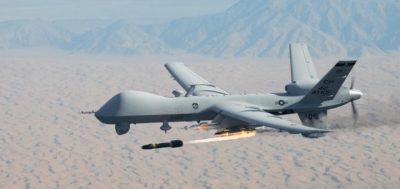British Bombing in Syria Reaches Record High

Britain carried out a record number of air strikes in Syria during the last month of 2018, despite mounting concerns over civilian casualties and costs.
New data obtained by research group Drone Wars has “laid bare” the scale of British bombing in the region.
The group found that Britain dropped 75 bombs over Syria in December, as planes and drones stepped up their attack on the last Isis stronghold.
It was the most intense month of aerial bombardment last year, bringing the annual total to 464 munitions from 225 separate raids.
And while the Ministry of Defence (MoD) has published the number of air strikes, it is much more secretive about civilian casualties, causing concern about who was caught in the crossfire.
As well as local Syrians, kidnapped British journalist John Cantile may also be among those at risk from air strikes.
The war photographer was snatched by Isis terrorists in 2012 and presumed dead, but last week Security Minister Ben Wallace insisted he was still alive.
Mr Cantile’s supporters said on Twitter that they “hope and pray that this turns out to be true.”
Campaign group Stop the War said the new data “marks an astonishing increase in strikes in Syria.”
Its convener, Lindsey German, said:
“These were supposedly against Isis, which all sides agree has been much weakened in recent months.
“The concern must be that many casualties from these strikes will be civilians.
“There is neither monitoring of death and injury by the Ministry of Defence, nor is there any coverage of these attacks by media in this country.
“Parliament voted for these interventions but doesn’t bother to discuss or assess the consequences.”
The new data, obtained through freedom of information requests by Drone Wars, shows that Britain has fired over 4,100 missiles and bombs in a total of 1,925 strikes against Isis in Iraq and Syria from 2014-2018, costing over £300 million.
However the MoD has only acknowledged one civilian casualty throughout the entire campaign.
Reacting to the latest figures, Ms German said:
“In a time of austerity we are spending millions on these strikes. Time to stop.”
Analysis by Drone Wars shows a quarter of these strikes were conducted by Reaper drones.
The weapons dropped on Syria and Iraq include the so-called “Hellfire” and “Brimstone” missiles.
Chris Cole from Drone Wars said:
“Although Isis has been virtually defeated as a military force in Iraq and Syria, with its territory reduced to a few square miles in the Euphrates Valley, UK ministers and defence officials insist that UK strikes will continue until the group is absolutely and totally defeated.
“This [is] though other nations are withdrawing their forces and senior UK commanders acknowledge that Isis is no longer a credible military force.”
An MoD spokesperson said:
“We use whichever asset meets the operational requirement, that can be either manned fast jets such as Typhoon, or remotely piloted aircraft such as Reaper.”
*
Note to readers: please click the share buttons below. Forward this article to your email lists. Crosspost on your blog site, internet forums. etc.

